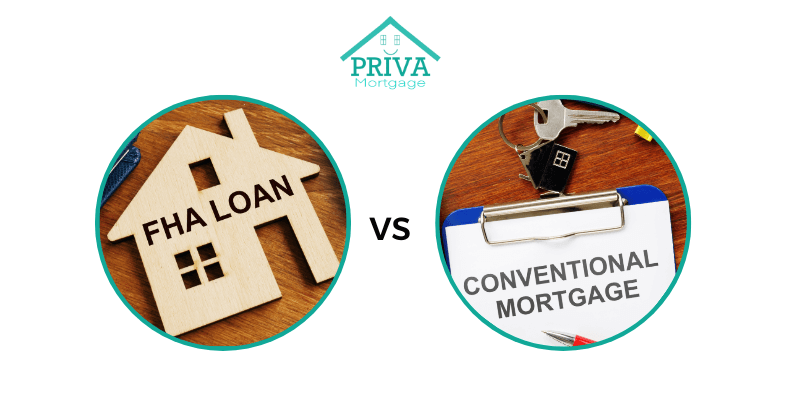When looking for a mortgage, you’ll have many options, including FHA and conventional loans. Determining which option is right for you when comparing FHA vs. conventional loans is important.
Your mortgage payment is a large obligation, and a house is a big investment. So here’s what to think about before borrowing a mortgage.
Overview of FHA Loans Vs. Conventional Loans
All mortgage loans are money lent to you to buy a home. The type of mortgage you qualify for depends on your credit score, debt-to-income ratio, and down payment.
The better your qualifying factors are, the better the loan terms you’ll get. For example, borrowers with great credit and a low debt-to-income ratio usually qualify for conventional financing. This is a non-government-backed loan with great terms and competitive interest rates.
If you’ve suffered financial troubles or have a high debt-to-income ratio, you may need an FHA government-backed loan with more flexible guidelines.
Also Read: Types of Mortgage Loans
What Is An FHA Loan?
The FHA guarantees FHA loans. They guarantee lenders that they will pay them back a portion of the funds they lose if a borrower defaults.
The FHA has specific requirements for each loan to qualify as an FHA loan. As long as FHA-approved lenders ensure each loan meets those guidelines, the FHA will guarantee the loan.
Getting approved for an FHA loan is easier because the guidelines are more relaxed than conventional loan guidelines.
The FHA requires the following guidelines when qualifying for an FHA loan:
- Minimum 580 credit score
- Maximum 43% debt-to-income ratio
- Minimum 3.5% down payment
- Income and employment stability for the last two years
- Proof of income with paystubs, W-2s, and/or tax returns
- Proof of assets for the down payment and closing costs
- Proof you’ll live in the home as your primary home
Each FHA lender can add to these guidelines if they wish, but all FHA loans must meet these guidelines at a minimum.
All FHA loans require mortgage insurance for the life of the loan. Borrowers are responsible for the insurance premiums for as long as they have the FHA loan. This adds to the mortgage payment on an FHA loan.
What Is A Conventional Loan?
A conventional loan isn’t backed by any government agencies. Lenders take the risk when lending you funds. They have tougher underwriting requirements to compensate for the risk to ensure you won’t default.
Like FHA loans, conventional loans require insurance to protect them if you default. However, they only require it if you put down less than 20% on the home. Even if you have to pay mortgage insurance when you borrow the funds, you can request cancellation of the PMI when you owe less than 80% of the home’s value.
Lenders require the following for conventional loans:
- Minimum 620 credit score
- Maximum 36% debt-to-income ratio
- Income and employment stability for the last two years
- Minimum 5% down payment
- Proof of income with paystubs, W-2s, and/or tax returns
- Proof of assets for the down payment and closing costs
How to Compare FHA vs. Conventional Loans
First, consider your credit scores. Do you have the credit score to qualify for a conventional loan? Then, ask each lender you’re interested in applying to what credit score they require.
If you meet the credit score requirement, next consider the debt-to-income ratio. Conventional loans require a 36% debt-to-income ratio, but some lenders allow a slightly higher DTI if you have other compensating factors.
Next, consider the down payment. FHA loans require at least 3.5% down, and conventional require at least 5% down.
It’s an easy decision if you don’t have the 5% to put down but remember that most lenders allow you to use gift funds for the down payment.
Finally, consider where you’re buying the home for your own use or an investment. FHA loans are only for your main home. You can’t use the loan to purchase a vacation home or investment property.
Which Loan is Best for You?

You have a few things to consider when considering an FHA loan and a conventional loan. If you qualify for both loans, most people choose the conventional loan. However, the FHA loan may be better if you’d rather take advantage of the smaller down payment requirements and keep more money on hand for emergencies.
Next, compare the payments. FHA loans will include mortgage insurance. Conventional loans will only include it if you put less than 20% down on the home. The rates will likely be competitive, but compare them anyway.
Finally, think about how long you’ll own the home. If it’s a temporary purchase, you might take the FHA loan since it requires a lower down payment. You won’t live in the house long enough to worry about paying mortgage insurance for too long, and you can use the capital for other investments.
However, if this is your ‘forever home,’ you’ll likely want to keep the payments as low as possible. Making a larger down payment and avoiding mortgage insurance or having mortgage insurance you can cancel in a few years makes the most sense.
However, some people don’t have a choice. They don’t have the credit to qualify for a conventional loan, or their debt-to-income ratio is too high. If that sounds like you, take the FHA loan now and consider refinancing into a conventional loan when you qualify.
Final Thoughts
When comparing FHA vs. conventional loans, you have a lot to consider. First, look at the total cost of both loans and decide which makes the most financial sense. For example, suppose you choose an FHA loan but want to eliminate mortgage insurance in the future. In that case, you can refinance into a conventional loan if your credit score and debt-to-income ratio qualify. Of course, it often makes the most sense if you are eligible for a conventional loan.







